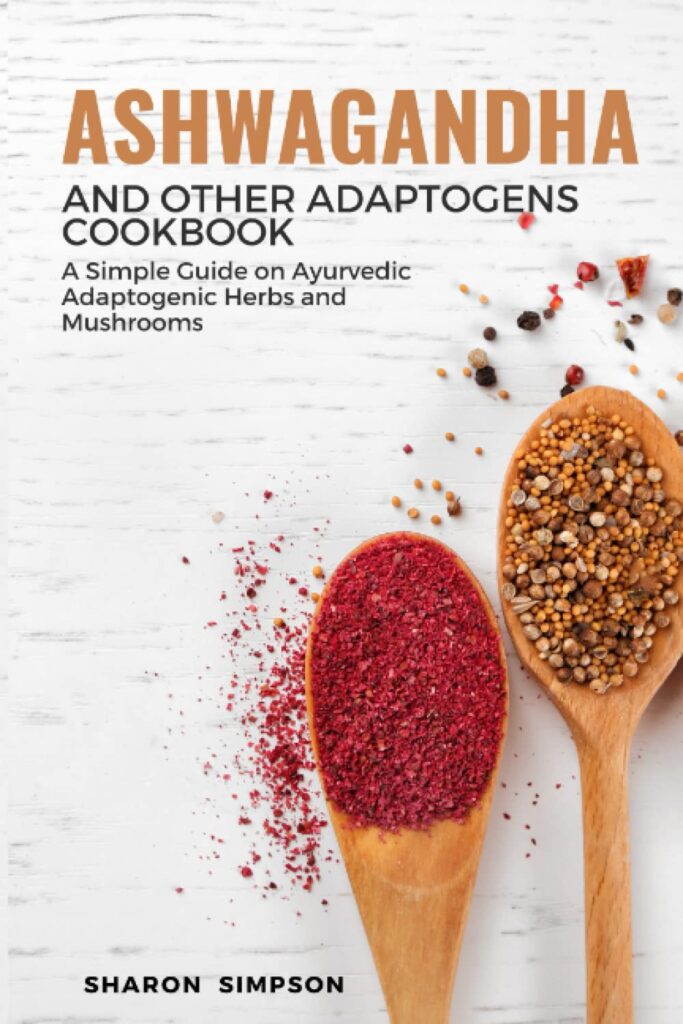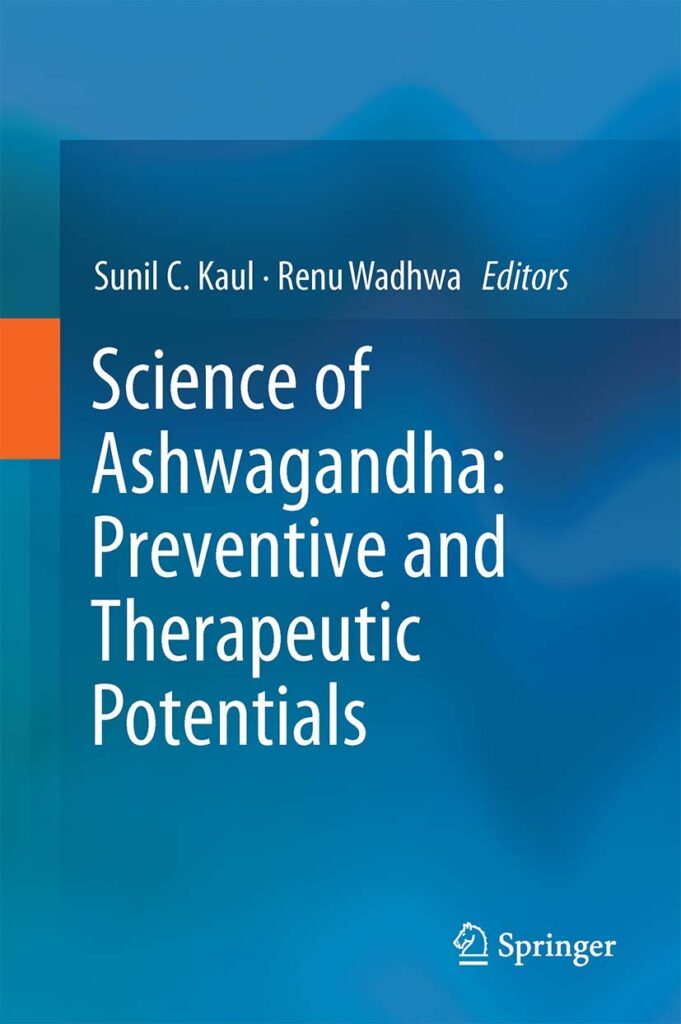Ashwagandha Books
The Complete Guide to Adaptogens: From Ashwagandha to Rhodiola, Medicinal Herbs That Transform and Heal

This is a comprehensive guidebook that explores the world of adaptogens, medicinal herbs that can help the body adapt to stress and support overall health.
The book is divided into two parts. The first part provides an in-depth overview of adaptogens, including their history, how they work, and the various types of adaptogens. The author also explains how to incorporate adaptogens into your daily routine and provides helpful tips on dosage, preparation, and storage.
The second part of the book is a comprehensive guide to specific adaptogenic herbs, including ashwagandha, rhodiola, eleuthero, holy basil, and many others. Each herb is described in detail, including its traditional uses, modern scientific research, and practical applications.
One of the strengths of this book is its accessibility. Despite the complex subject matter, the author explains everything in a clear and concise manner that is easy to understand. The book is also well-organized, making it easy to find information on specific adaptogens or topics.
Another strength of the book is the author’s attention to detail. She provides a wealth of information on each adaptogen, including its chemical composition, potential side effects, and interactions with other herbs and medications. This level of detail makes the book a valuable resource for anyone interested in using adaptogens for health and wellness.
Overall, this book is an excellent resource for anyone interested in learning more about adaptogenic herbs. Whether you are a novice or an experienced herbalist, this book is packed with useful information and practical advice that can help you achieve better health and well-being. Highly recommended!
Ashwagandha and Other Adaptogens Cookbook: A Simple Guide on Ayurvedic Adaptogenic Herbs and Mushrooms

This is a cookbook that focuses on incorporating adaptogenic herbs and mushrooms into everyday meals. The book is aimed at people who are looking for a natural way to improve their health and wellness using whole, natural ingredients.
The book begins with an overview of adaptogenic herbs and mushrooms and their benefits. The author explains how these herbs and mushrooms can help the body adapt to stress and support overall health. The book also provides an introduction to Ayurveda, a traditional system of medicine from India that emphasizes the importance of balancing the mind, body, and spirit.
The second part of the book contains a collection of recipes that incorporate adaptogenic herbs and mushrooms, including ashwagandha, reishi, and chaga. Each recipe is designed to be simple and easy to follow, with a focus on using whole-food ingredients that are easy to find at your local grocery store.
One of the strengths of this book is its accessibility. The author explains everything in a clear and concise manner that is easy to understand, making it an excellent resource for anyone interested in learning more about adaptogens and Ayurveda. The recipes are also easy to follow and use simple, whole-food ingredients, making them accessible to even novice cooks.
Another strength of the book is the variety of recipes. From smoothies and teas to soups and stews, there is something for everyone in this cookbook. The recipes are also designed to be adaptable, making it easy to customize them to suit your personal tastes and preferences.
Ashwagandha (Withania somnifera): Activities and Applications of the Versatile Ayurvedic Herb

This is a comprehensive guide to ashwagandha, one of the most important herbs in Ayurveda. The book explores the many health benefits of this powerful herb and provides practical guidance on how to use it to improve health and wellness.
The book is divided into several chapters, each of which focuses on a different aspect of ashwagandha. The author begins by providing an overview of the herb and its history, explaining how it has been used in Ayurvedic medicine for centuries to treat a wide range of health issues.
The book then delves into the science behind ashwagandha, exploring the many active compounds that make it such a powerful herb. The author explains how these compounds work to support overall health and wellness, including their effects on the immune system, nervous system, and endocrine system.
The book also provides practical guidance on how to use ashwagandha, including dosages and preparation methods. The author provides detailed instructions on how to prepare ashwagandha in various forms, including teas, tinctures, and capsules, making it easy for readers to incorporate the herb into their daily routine.
One of the strengths of this book is its depth of knowledge. The author clearly has a deep understanding of ashwagandha and its many health benefits, and the book is filled with valuable insights and practical advice. The author’s writing style is clear and concise, making the book easy to read and understand.
Another strength of the book is its focus on science. The author provides a wealth of information on the active compounds in ashwagandha and how they work to support health and wellness. This scientific approach sets the book apart from other guides to Ayurvedic herbs, making it an excellent resource for anyone interested in the science behind natural remedies.
Overall, “Ashwagandha (Withania somnifera): Activities and Applications of the Versatile Ayurvedic Herb” is an excellent resource for anyone interested in ashwagandha and its many health benefits. The book provides a wealth of information on the herb, including its history, science, and practical applications.
Highly recommended!
Science of Ashwagandha: Preventive and Therapeutic Potentials

“Science of Ashwagandha: Preventive and Therapeutic Potentials” by Sunil C. Kaul is a comprehensive guide to the scientific research on ashwagandha, one of the most important herbs in Ayurvedic medicine. The book explores the many health benefits of this powerful herb and provides detailed information on how it can be used to prevent and treat a wide range of health issues.
The book begins by providing an overview of ashwagandha, explaining its history and use in Ayurvedic medicine. The author then delves into the science behind ashwagandha, exploring the many active compounds that make it such a powerful herb. The book explains how these compounds work to support overall health and wellness, including their effects on the immune system, nervous system, and endocrine system.
One of the strengths of this book is its depth of knowledge. The author provides a wealth of information on the scientific research on ashwagandha, including studies on its effects on cancer, inflammation, and stress. The book also explores the many ways in which ashwagandha can be used to improve cognitive function, including its effects on memory and focus.
Another strength of the book is its focus on practical applications. The author provides detailed information on how ashwagandha can be used to prevent and treat a wide range of health issues, including anxiety, depression, and insomnia. The book also provides practical guidance on how to use ashwagandha, including dosages and preparation methods.
ASHWAGANDHA: Everything you need to know about Ashwagandha

This book, by Ferdinal Quinones, is a comprehensive guide to the many benefits of ashwagandha, an herb that has been used for centuries in Ayurvedic medicine. The book is well-researched and covers a wide range of topics related to ashwagandha, from its history and traditional uses to its modern applications in treating various health conditions.
One of the things I appreciated about this book was the author’s clear writing style. Despite the complex scientific concepts involved, the book was easy to read and understand. The author also used real-life case studies to illustrate how ashwagandha can be used to treat specific conditions, which helped to make the information more relatable.
The book is organized into several sections, each covering a different aspect of ashwagandha. The first section provides an overview of the herb’s history and traditional uses. The second section discusses the science behind ashwagandha, including its chemical composition and how it works in the body. The third section covers the many health benefits of ashwagandha, including its ability to reduce stress and anxiety, boost the immune system, and improve cognitive function. The fourth section provides practical advice on how to incorporate ashwagandha into your daily routine, including dosage recommendations and tips on choosing the right form of the herb.
I found this book to be an excellent resource for anyone interested in learning more about ashwagandha. The author’s expertise in the field of integrative medicine is evident, and the book is filled with useful information backed up by scientific research. Whether you’re looking to reduce stress, boost your immune system, or simply improve your overall health and well-being, “ASHWAGANDHA: Everything you need to know about Ashwagandha” is a must-read.
ASHWAGANDHA: Everything you need to know about Ashwagandha

“Ashwagandha – The Miraculous Herb!: Holistic Solutions & Proven Healing Recipes for Health, Beauty, Weight Loss & Hormone Balance” by Elena Garcia is a thorough and well-researched guide on the health benefits of ashwagandha. The author discusses the history of ashwagandha and its traditional use in Ayurvedic medicine, as well as its chemical composition and how it works in the body.
One of the strengths of this book is its emphasis on the importance of a holistic approach to health. The author provides practical advice on how to incorporate ashwagandha into your daily routine, including dosage recommendations and tips on choosing the right form of the herb. The book also includes a variety of healing recipes using ashwagandha, including teas, smoothies, and even beauty treatments.
I appreciated the author’s focus on evidence-based information and scientific research. The book provides a comprehensive overview of the potential health benefits of ashwagandha, including its ability to reduce stress and anxiety, boost the immune system, and balance hormones. The author also provides information on the potential side effects of ashwagandha and who should avoid using it.
I found this book to be a valuable resource for anyone interested in natural remedies and holistic health. The author’s expertise in the field of herbal medicine is evident, and the book is filled with useful information that is accessible to readers of all levels of knowledge. Whether you’re looking to improve your overall health, achieve hormone balance, or address specific health concerns, this book is a great resource to have on hand.